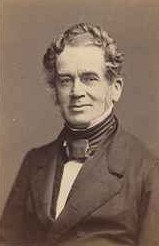Friedrich Adolf Trendelenburg
| Friedrich Adolf Trendelenburg | |
|---|---|
 |
|
| Born |
November 30, 1802 Eutin, Lübeck, Holy Roman Empire |
| Died | January 24, 1872 (aged 69) Berlin, Brandenburg, Prussia, German Empire |
| Alma mater |
University of Kiel Leipzig University University of Berlin (PhD, 1826) |
| Era | 19th-century philosophy |
| Region | Western philosophy |
| School |
Aristotelianism German idealism Aristotelian idealism |
| Institutions | University of Berlin |
|
Main interests
|
Logic, Metaphysics |
|
Notable ideas
|
Trendelenburg's gap, motion as the fundamental fact common to being and thought, putting the organic/teleological view of the world on a modern foundation |
|
Influences
|
|
|
Influenced
|
|
| Friedrich Adolf Trendelenburg | |
|---|---|
| Thesis | Platonis de ideis et numeris doctrina ex Aristotele illustrata (On Plato's Doctrine of Ideas and Numbers as Illustrated by Aristotle) (1826) |
| Doctoral advisor | Georg Ludwig König |
| Doctoral students | Rudolf Christoph Eucken |
Friedrich Adolf Trendelenburg (November 30, 1802 – January 24, 1872) was a German philosopher and philologist.
He was born at Eutin, near Lübeck. He was educated at the universities of Kiel, Leipzig, Berlin. He became more and more attracted to the study of Plato and Aristotle, and his doctoral dissertation (1826) was an attempt to reach through Aristotle's criticisms a more accurate knowledge of the Platonic philosophy (Platonis de ideis et numeris doctrina ex Aristotele illustrata).
He declined the offer of a classical chair at Kiel, and accepted a post as tutor to the son of an intimate friend of Karl vom Stein zum Altenstein, the Prussian minister of education. He held this position for seven years (1826–1833), occupying his leisure time with the preparation of a critical edition of Aristotle's De anima (1833; 2nd ed. by Christian Belger, 1877). In 1833 Altenstein appointed Trendelenburg extraordinary professor in Berlin, and four years later he was advanced to an ordinary professorship.
For nearly 40 years, he proved himself markedly successful as a teacher, during the greater part of which time he had to examine in philosophy and pedagogics all candidates for the scholastic profession in Prussia. His teaching method was highly regarded by Søren Kierkegaard who called him "one of the most sober philosophical philologists I know." He was elected a Foreign Honorary Member of the American Academy of Arts and Sciences in 1861.
Trendelenburg's philosophizing is conditioned throughout by his loving study of Plato and Aristotle, whom he regards not as opponents but as building jointly on the broad basis of idealism. His own standpoint may be called a modern version of Aristotelianism. While denying the possibility of an absolute method and an absolute philosophy, as contended for by Hegel and others, Trendelenburg was emphatically an idealist in the ancient or Platonic sense; his whole work was devoted to the demonstration of the ideal in the real. But he maintained that the procedure of philosophy must be analytic, rising from the particular facts to the universal in which we find them explained. We divine the system of the whole from the part we know, but the process of reconstruction must remain approximative. Our position forbids the possibility of a final system. Instead, therefore, of constantly beginning afresh in speculation, it should be our duty to attach ourselves to what may be considered the permanent results of historic developments.
...
Wikipedia
